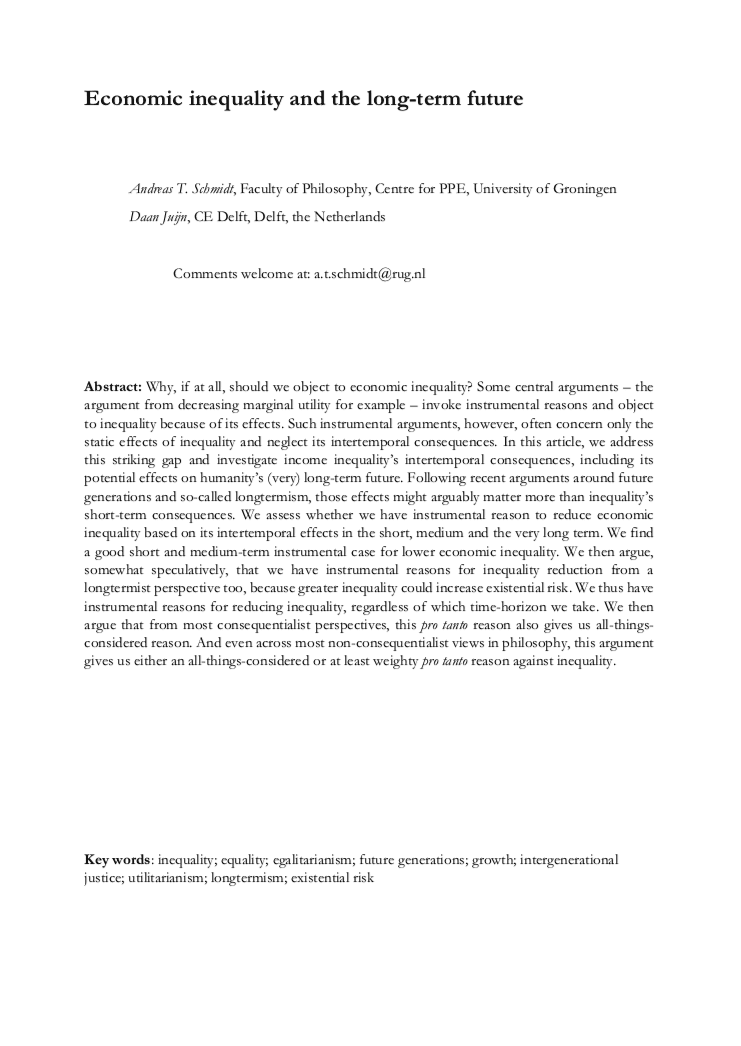Economic inequality and the long-term future
Andreas T. Schmidt (University of Groningen) and Daan Juijn (CE Delft)
GPI Working Paper No. 4-2021, published in Politics, Philosophy & Economics
Why, if at all, should we object to economic inequality? Some central arguments – the argument from decreasing marginal utility for example – invoke instrumental reasons and object to inequality because of its effects. Such instrumental arguments, however, often concern only the static effects of inequality and neglect its intertemporal consequences. In this article, we address this striking gap and investigate income inequality’s intertemporal consequences, including its potential effects on humanity’s (very) long-term future. Following recent arguments around future generations and so-called longtermism, those effects might arguably matter more than inequality’s short-term consequences. We assess whether we have instrumental reason to reduce economic inequality based on its intertemporal effects in the short, medium and the very long term. We find a good short and medium-term instrumental case for lower economic inequality. We then argue, somewhat speculatively, that we have instrumental reasons for inequality reduction from a longtermist perspective too, because greater inequality could increase existential risk. We thus have instrumental reasons for reducing inequality, regardless of which time-horizon we take. We then argue that from most consequentialist perspectives, this pro tanto reason also gives us all-things-considered reason. And even across most non-consequentialist views in philosophy, this argument gives us either an all-things-considered or at least weighty pro tanto reason against inequality.
Other working papers
How to resist the Fading Qualia Argument – Andreas Mogensen (Global Priorities Institute, University of Oxford)
The Fading Qualia Argument is perhaps the strongest argument supporting the view that in order for a system to be conscious, it does not need to be made of anything in particular, so long as its internal parts have the right causal relations to each other and to the system’s inputs and outputs. I show how the argument can be resisted given two key assumptions: that consciousness is associated with vagueness at its boundaries and that conscious neural activity has a particular kind of holistic structure. …
Consequentialism, Cluelessness, Clumsiness, and Counterfactuals – Alan Hájek (Australian National University)
According to a standard statement of objective consequentialism, a morally right action is one that has the best consequences. More generally, given a choice between two actions, one is morally better than the other just in case the consequences of the former action are better than those of the latter. (These are not just the immediate consequences of the actions, but the long-term consequences, perhaps until the end of history.) This account glides easily off the tongue—so easily that…
High risk, low reward: A challenge to the astronomical value of existential risk mitigation – David Thorstad (Global Priorities Institute, University of Oxford)
Many philosophers defend two claims: the astronomical value thesis that it is astronomically important to mitigate existential risks to humanity, and existential risk pessimism, the claim that humanity faces high levels of existential risk. It is natural to think that existential risk pessimism supports the astronomical value thesis. In this paper, I argue that precisely the opposite is true. Across a range of assumptions, existential risk pessimism significantly reduces the value of existential risk mitigation…

